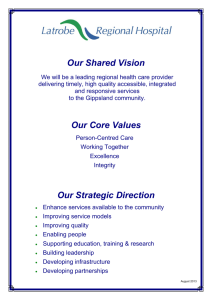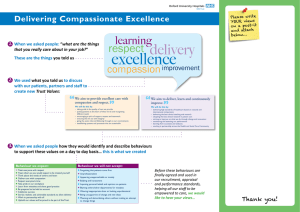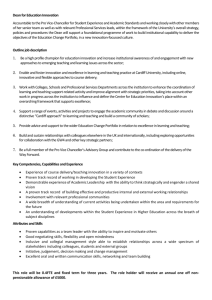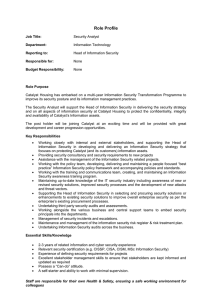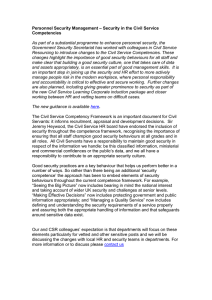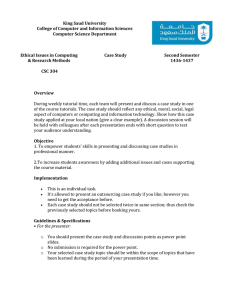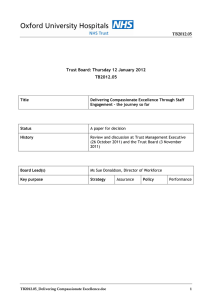a personal guide for our staff LIVING OUT OUR VALUES
advertisement
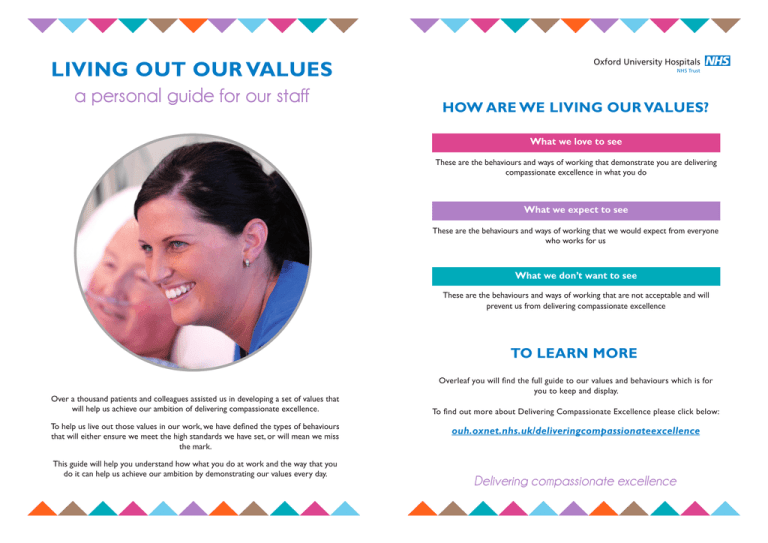
LIVING OUT OUR VALUES a personal guide for our staff Oxford University Hospitals NHS Trust HOW ARE WE LIVING OUR VALUES? What we love to see These are the behaviours and ways of working that demonstrate you are delivering compassionate excellence in what you do What we expect to see These are the behaviours and ways of working that we would expect from everyone who works for us What we don’t want to see These are the behaviours and ways of working that are not acceptable and will prevent us from delivering compassionate excellence TO LEARN MORE Over a thousand patients and colleagues assisted us in developing a set of values that will help us achieve our ambition of delivering compassionate excellence. To help us live out those values in our work, we have defined the types of behaviours that will either ensure we meet the high standards we have set, or will mean we miss the mark. This guide will help you understand how what you do at work and the way that you do it can help us achieve our ambition by demonstrating our values every day. Overleaf you will find the full guide to our values and behaviours which is for you to keep and display. To find out more about Delivering Compassionate Excellence please click below: ouh.oxnet.nhs.uk/deliveringcompassionateexcellence Delivering compassionate excellence Oxford University Hospitals What we love to see NHS Trust VALUES AND BEHAVIOURS What we love to see Compassion What we expect to see What we don’t want to see Putting patients at the heart of what we do and recognising different needs Learning What we expect to see Learning from successes and setbacks You’re enthusiastic about learning and development and initiate your own learning opportunities. You take responsibility for own learning and development and ensure that your learning is up to date. You’re not proactive about your learning and development – you take a passive approach to it. You share learning and development with others in your team and beyond. You encourage others to embrace learning and development opportunities. You’re open and aware about limitations and gaps in your expertise and you’re willing to close these gaps with appropriate learning opportunities. You’re overconfident and unwilling to admit any shortcomings or you don’t share what you’ve learned with colleagues and patients. You reflect on your mistakes and learn from them.You think about how to change or improve your practice to avoid repeating them. You’re defensive about making mistakes and don’t change the way you work to avoid repeating them. You understand the link between learning and improving the service we provide. You lack awareness about learning and the link between quality, performance and improved patient care. You see things from the patient and family’s perspective and always put their needs first. You put the patient and their family at the centre of your work. You tend to focus on your own needs and put them before the patient’s needs. You take the time and effort to understand people and their situations and do everything you can to care for them. You care about people and their situations. You sometimes treat others in a way that you yourself wouldn’t want to be treated. You reflect on your mistakes and learn from them.You work alongside others to identify ways to avoid mistakes in the future. You value and acknowledge the experiences of other people. You’re non-judgemental about other people and their experiences. You can be insensitive and judgemental towards colleagues and patients. You make the link between what you learn and how it benefits the patient, organisation or colleagues. You go the extra mile for your colleagues and/or patients. You support people through difficult situations, listen to them to understand their needs and do what you can to help. You do the minimum required to help other people. Respect What we don’t want to see Delivery Delivering high standards of health care for our patients and customers You consistently deliver over and above what’s expected of you. You focus on delivering high standards in your work at all times.You do what you say you’ll do. You focus on your own priorities and interests. As a result you tend to under deliver and you don’t achieve your potential. Encouraging a spirit of support, integrity, respect and teamwork You recognise everyone as an individual and tailor your approach to meet their particular needs. You listen to people and treat them with dignity and respect. You treat everyone the same and don’t recognise people as individuals. You communicate openly and honestly when things go wrong and take responsibility for making changes. You clarify and manage other people’s expectations.You communicate openly and honestly when things go wrong. You don’t clarify or manage other people’s expectations.You’re not transparent or clear in explaining when things go wrong. You think carefully about how your actions will affect other people and reflect on the impact you’ve had on them. You communicate clearly and respectfully. You behave disrespectfully towards other people and don’t think about how your actions might affect them. You actively encourage growth in partnership and look for opportunities to develop partnership working with other people. You deliver outcomes in partnership with other people. You work in isolation and don’t deliver outcomes with other people. You make sure that other people understand the importance of respecting and safeguarding people’s confidential information. You respect and safeguard people’s confidential information. You don’t respect other people’s confidential information or try to safeguard it. You encourage and support other people to take responsibility for delivering quality outcomes as quickly as possible. You take responsibility for delivering quality outcomes as quickly as possible. If you can’t deliver on your outcomes and commitments, you blame other people. You challenge any form of harassment or discrimination you see happening to colleagues or patients. You escalate your concerns when you see any form of harassment or discrimination and make sure the problems are addressed. You don’t challenge instances of harassment or discrimination towards colleagues or patients. Excellence Taking pride in the quality of care we provide for our patients and customers You strive for excellence in everything you do and inspire and motivate other people to deliver an excellent service. You’re motivated and enthusiastic about delivering an excellent service to other people. You do the minimum amount required in your work.You work in isolation from others and don’t share your expertise or ideas with other people. You celebrate other people’s success and encourage them to strive for excellence. You celebrate success and acknowledge and share with other people when things go well. You don’t share or celebrate success with other people. You collaborate with other people to review performance and quality You analyse your performance and the quality of care you provide. You lack self-awareness and don’t analyse your performance at work. You’re a role model for the organisation and you inspire other people by example. You present a professional approach and appearance. You often don’t present a professional approach or appearance. Improvement Striving to improve on what we do through change and innovation You actively seek feedback from patients, colleagues and managers about your work and performance and you value what they say. You value feedback from patients, colleagues and managers and you’re willing to change the way you work as a result. You don’t ask for feedback and don’t see the value of it.You don’t see patients or their families as a source of feedback. You regularly set realistic, fair and achievable targets in your work for yourself and other people and review them regularly. You work towards targets and review progress against targets given for yourself and other people. You set targets and objectives that are unclear or you work towards targets without reviewing your progress. You’re always thinking creatively and innovatively about work and looking for ways to change and improve practices. You’re open to being challenged about how you work and you encourage other people to try new ways of working. You react defensively to new ideas and you don’t take on board other people’s points of view. You take responsibility for putting changes and improvements in place to improve patient care and the service we provide. You help and support the people who put changes and improvements in place to improve patient care and the service we provide. You pass the responsibility for putting changes in place to other people or you undermine the efforts of people making changes and improvements.
